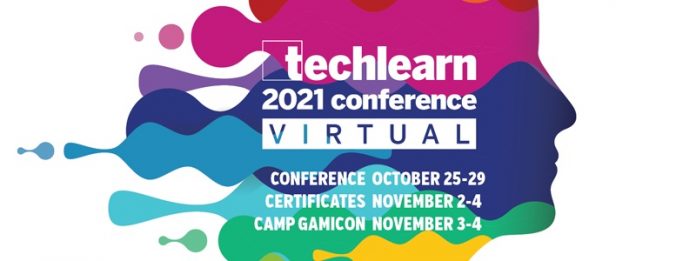
Technology was the star of Training’s TechLearn 2021 Virtual Conference earlier this fall, but what really made it shine was the engagement and enthusiasm of the 500-plus attendees who chatted, collaborated, and connected during the five-day live event.
Attendees accessed (either live or on-demand via the recordings) 130 learning experiences, including 88 practical breakout sessions, Training Technology Test Kitchen demos, problem-solving sessions, maker labs, interactive tours, five horizon-expanding keynotes, gamification adventure GamiCon, and more. Producer John Chen masterfully managed the technology platform and kept attendees, speakers, and session ambassadors energized with dance-inducing music playlists. In short, this was the place for Learning & Development (L&D) professionals to hone their ability to design, deliver, and manage impactful training.
“I knew I wanted the content, but I was so skeptical about attending a week-long virtual training going into the TechLearn 2021 Conference,” revealed one attendee. “But my fears were completely put to rest within the first day! The sessions were engaging, the content was fresh and relevant, and the gamification piece was an added dose of fun. This was my first, but I will absolutely attend another Training magazine conference in the future!”
Another attendee added: “In times of a pandemic, a virtual conference is a great way to reconnect with the content we love and meet like-minded people.”
One presenter noted, “I thought they did a great job with their energy and ambassadors. Probably the best virtual conference I’ve presented at!”
Keynote Takeaways
Austin Kleon, author, “Steal Like an Artist,” “Show Your Work!” and “Keep Going”:
To quote actor John Cleese, “Creativity is not a talent. It is a way of operating.” Here are Kleon’s 10 principles to help you do more creative work:
- Realize that you don’t have to be a genius. A collective form of genius—an ecosystem—is more valuable than an ego system.
- Take the advice from my book, “Steal Like an Artist”: Figure out if something is worth stealing. If not, move on.
- Write the book you want to read. If there is already a book on it, then read it.
- Use your hands—step away from the screen.
- Recognize the importance of side projects and hobbies. Practice productive procrastination. (Note: Hobbies are not side hustles.)
- Share your process. Take people behind the scenes. Become a documentarian of what you do. Tell good stories. Teach what you know.
- Don’t turn into a vampire (who saps folks’ energy) or human spam (someone who constantly wants to put forth their ideas but not listen to anyone else’s).
- Remember that ordinary + extra attention=Extraordinary
- Be boring. It’s the only way to get work done. Little bits and pieces over time add up to something big. Take care of yourself.
- Understand that creativity is subtraction. You have to choose what to leave out of your life.
Audrey Tang, Taiwan’s Digital Minister:
Tang is a fervent believer in transparency, open data, open governance, and civil society-government collaboration. She orchestrated the creation of vTaiwan. “This is a method of tapping collective intelligence of civil society with open-source software tools such as Polis for the purpose of building popular consensus on how the government should approach controversial topics,” she explained. “There are no options for trolling.The idea is to invite people to contribute to rather than consume information.”
The “Input Crowd, Output Meaning” initiative uses social media paradigms for citizens to create digital petitions. Those with 5,000 signatories are brought to the premier and government ministries to be addressed.
“I advocate for goals chosen by people, monitored by government,” she noted. “Think about an Internet of Beings (instead of Things).” This means:
- Shared reality
- Collaborative learning
- Human experiences
- Plurality
Her three key philosophies for social media campaigns: fast, fair, fun. She emphasizes humor vs. rumor when communicating in the “New Normal,” which also has been part of Taiwan’s strategy for quickly responding to false information about COVID-19.
One attendee noted, “Steve Dahlberg’s interview with Audrey Tang was excellent—she provided powerful real-world examples, not the vacuous soundbites we often hear. Hopefully, Tang and Taiwan are pioneering what will become the transparency and public engagement standard for other nations.”
Watch this keynote on our YouTube channel: https://bit.ly/techlearntang
Anh Nguyen Phillips, Deloitte’s Research Lead:
Technology is like duct tape, Phillips posited. “It doesn’t come with instructions, and you can use it in thousands of ways.”
The question is: How to leverage technology instead of chase it? Phillips used this analogy: “Just as buying all the mechanic’s tools doesn’t make you a mechanic, buying all the latest technology doesn’t mean you know how to use it.”
Only 30 percent of companies rate themselves as digitally mature, according to Phillips. “An organization’s digital strategy needs to be clearly articulated, widely communicated, and integrated into its core. It can’t be sitting off to the side somewhere.”
Phillips explained that digitally mature organizations:
- Actively increase agility
- Encourage experiments and continual learning
- Recognize and reward collaboration
- Accept the risk of failure
That means we need new leaders and leadership skills, Phillips explained, pointing specifically to leaders who:
- Have a transformative vision
- Are forward-looking
- Understand technology
- Are change oriented
“In today’s digital age, learning is key,” Phillips continued. “We need to train on hard and soft skills constantly via multiple modalities. We need to adapt to constant changes. We need to make learning more exploratory, engage in experiments, and create new knowledge. Ask, ‘What can you do to expand your own learning experiences? And how can you foster that within your teams?’”
Ariam Mogos, Futurist Fellow, Stanford d.school:
Lots of good can come from technology, Mogos believes, “but it also brings the potential for harm, including amplifying structural inequities. That’s why it’s important to take an equity pause. Are the processes isolating people based on race, gender, ethnicity?”
Mogos explained that it all starts with culture. “Look inward,” she recommended. “Equity-centered design starts with you.”
She offered some design abilities when thinking about equity:
- Learn from others: Ask questions, be open to collaboration, share early and often.
- Build and craft intentionality. Think about the implications.
- Communicate deliberately. Think about how what you are designing is relevant to others.
Riley (Gary) Mills, Co-Founder and COO, Pinnacle Performance Company:
Mills explained that we use stories to:
- Overcome objections
- Build rapport
- Share a vision
- Manage change
- Demonstrate value
Then he detailed what the dramatic structure includes:
- Exposition (who, what, when)
- Inciting incident (identify the problem)
- Conflict is activated/plot builds
- Turning point/climax/conflict resolution
- Takeaways
Jay Bonasinga, author of “The Walking Dead” novels:
“Our value is that we are human and that’s how we tell great stories,” Bonasinga revealed. “Imperfection is our superpower. Mine your experiences.”
His advice when it comes to storytelling: “Less is more. For every word you type, don’t think you are getting paid by the word but that you are paying for each word.
“People remember emotion,” he added. “I always remember this short but powerful Hemingway story: ‘For sale. Baby carriage. Never used.’”
The Sky’s the Limit
What was one of the most powerful lessons learned at TechLearn 2021? “With the right access to tools and knowledge, people can do anything,” said Audrey Van de Castle, senior manager, Training Innovation and Maker Initiatives at Stanley Black & Decker, who led attendees through a virtual Innovations In Training Tour at the company. “There is no limit. Give people the space to fail and to get better.”
The learning continues at our in-person Training 2022 Conference & Expo (February 28-March 2 at Disney’s Coronado Springs Resort in Orlando, FL). Save $300 with the Super Early-Bird rate for the conference when you register by DECEMBER 23. Register at: https://www.trainingconference.com/2022/discounts.cfm
We hope to see you there!




